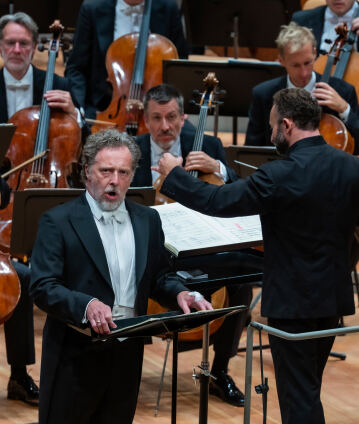Kirill Petrenko and Christian Gerhaher

A concert full of orchestral force: Karl Amadeus Hartmann’s Gesangsszene from Sodom and Gomorrah – composed in 1962/63 under the shadow of the arms race between the superpowers – outlines a vision of the end of the world. Kirill Petrenko presented the powerful work with baritone Christian Gerhaher. Also dramatic are Iannis Xenakis’s Jonchaies and György Kurtág’s Stele. The world premiere of a new work by Márton Illés will be heard as well.
It is perhaps the most brilliant orchestral work of the late 20th century: Iannis Xenakis’s Jonchaies (“Thicket of rushes”). But this imposing musical sculpture by the composer, who was also a mathematician and engineer, never seems like the result of scientific concepts. Jonchaies is more like a force of nature bursting upon the listener – in keeping with Xenakis’s motto: “The sensual shock must be just as palpable as when listening to thunder or gazing into the infinite abyss.” The piece, permeated by powerful eruptions of sound, opens this concert with Kirill Petrenko and the Berliner Philharmoniker.
Baritone Christian Gerhaher then turns his attention to Karl Amadeus Hartmann’s confessional Gesangsszene based on texts from Jean Giraudoux’s play Sodom and Gomorrah. Composed during the Cold War, it is set against the backdrop of the threats posed by nuclear armament and massive environmental destruction.
Born in Budapest in 1975, Márton Illés is known for the direct effect of his music. The winner of the Ernst von Siemens Music Foundation grant doesn’t think much of serial composition: “Music,” he says, “always conveys emotional as well as physical and gestural content”. We will hear the world premiere of his new work Lég-szín-tér. The programme concludes with György Kurtág’s Stele, composed in memory of the late composer, conductor and teacher András Mihály: a lament composed for the Berliner Philharmoniker, in which Kurtág elevates personal anguish to the level of universal humanity.
© 2023 Berlin Phil Media GmbH
Related interview
Artists
Our recommendations
- Daniel Harding conducts Schumann’s “Scenes from Goethe’s Faust”
- Murray Perahia and Simon Rattle with Schumann’s Piano Concerto
- Kirill Petrenko conducts Mendelssohn’s “Elijah”
- Simon Rattle and Christian Gerhaher
- “Pelléas et Mélisande” with Simon Rattle, Christian Gerhaher and Magdalena Kožená
- Christian Thielemann conducts Brahms’s “Deutsches Requiem”